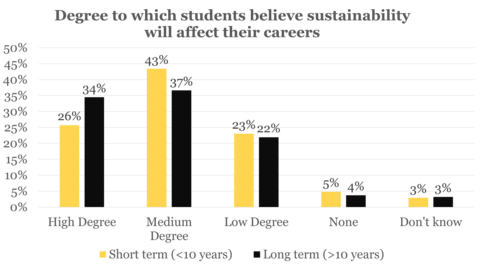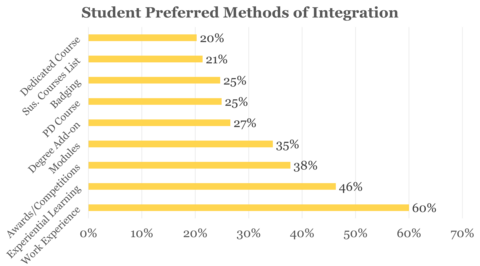Why sustainability in curriculum?
Our graduates are the leaders of tomorrow, and they will need sustainability-related skills and competencies to succeed as the world transitions toward a sustainable future and navigates with the range of deep sustainability challenges.
These skills are needed for the future of work.
As the world changes due to climate change and other major environmental changes, industries and professions are changing to meet these needs of a changing planet. Below are some of the facts and figures on the future of work as it relates to sustainability.
(Government of Canada, 2023)
(Phillip et al., 2022)
(Perna, 2023)
(Lindzon, 2023)
(Duke, 2023)
(Duke, 2023)
(KNIBB, 2016)
Students are looking for this content.
Now more than ever, students are aware of the global changes to our planet and concerned about how they will affect their future. Students have expressed interest in learning about sustainability topics integrated into their undergraduate experience, particularly as they see it to be relevant for their future careers. Below are two figures based on a Fall 2023 survey of University of Waterloo students, expressing their interest in this content.

Based on a Fall 2023 survey of 385 undergraduate students.

Based on a Fall 2023 survey of 385 undergraduate students.
This aligns with University of Waterloo strategic goals.
The University of Waterloo has made several commitments to including environmental sustainability and climate change content in undergraduate curriculum. By including sustainability in curriculum, you are aligning with University of Waterloo strategic plans and commitments.
See the University of Waterloo Climate Emergency Declaration.
Sources
Duke, S. (2023, May 1). The future of jobs is green: How climate change is changing labour markets. World Economic Forum. https://www.weforum.org/agenda/2023/04/future-of-jobs-is-green-2023-climate-change-labour-markets/
Government of Canada. (2023). Canada’s National Adaptation Strategy: Building resilient communities and a strong economy. https://www.canada.ca/en/services/environment/weather/climatechange/climate-plan/national-adaptation-strategy/full-strategy.html
Knibb, H. (2016). Green Skills for Sustainable Economic Growth: The Role of Canadian Colleges and Institutes in Advancing Education for Sustainability in Canada and Overseas. Colleges and Institutes Canada
Lindzon, J. (2023, September 5). Thinking beyond just “the green sector”: Why every organization needs workers with sustainability skills throughout their business. The Globe and Mail. https://www.theglobeandmail.com/business/article-thinking-beyond-just-the-green-sector-why-every-organization-needs/
Perna, M. C. (2023, September 21). Demand for green skills outpacing what the workforce can deliver-but there’s hope. Forbes. https://www.forbes.com/sites/markcperna/2023/09/21/demand-for-green-skills-outpacing-what-the-workforce-can-deliver-but-theres-hope/?sh=67be87ae5f24
Philip, Dr. P., Steinmann, J., & Barnes, D. (2022). Work toward net zero. Deloitte. https://www.deloitte.com/global/en/issues/climate/work-toward-net-zero.html?id=gx%3A2el%3A3pr%3A4work_toward_net_zero%3A5GC1000045%3A6abt%3A20221101%3Agc1000136
UK Universities Climate Network. (October 2021). Mainstreaming Climate Change Education in UK Higher Education Institutions. https://uucn.ac.uk/wp-content/uploads/2022/07/Mainstreaming-Climate-Change-Education.pdf